

Focus and Chill - productivity tactics for AuDHDers and other neurodivergent folks
Jeremy Nagel and Joey K
Welcome to the Focus and Chill podcast where we discuss productivity tactics that work for AuDHDers and other neurospicy people.
Every episode we interview guests with lived experience of neurodivergence who also have a solid productivity and habit game and pass the learnings on to you, our wise and benevolent audience.
Podcast sponsored by https://focusbear.io
Every episode we interview guests with lived experience of neurodivergence who also have a solid productivity and habit game and pass the learnings on to you, our wise and benevolent audience.
Podcast sponsored by https://focusbear.io
Episodes
Mentioned books
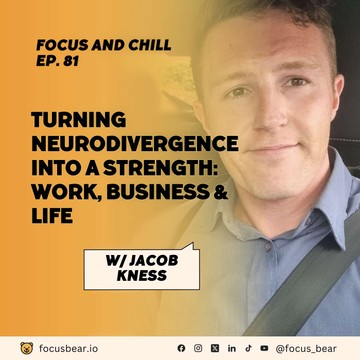
Feb 18, 2025 • 40min
Episode 81: Jacob Kness
Welcome to episode #81! We’re thrilled to be joined by Jacob Kness today.Jacob Kness is a social entrepreneur and project manager dedicated to improving autism employment opportunities. Diagnosed with autism, ADHD, and Tourette’s after experiencing a childhood stroke, Jacob has spent years navigating the intersection of neurodiversity and the workplace.Through his work at Asperger’s Victoria, he supports autistic job seekers by equipping them with skills, confidence, and opportunities for sustainable employment. In addition, his social enterprise Doughnuts provides hands-on employment experience, helping autistic individuals build real-world work skills.In this episode, we discuss autism and ADHD in the workplace, balancing structure with flexibility, and how to create sustainable career opportunities for neurodivergent professionals.Welcome to the show, Jacob!QuestionsJN: You were diagnosed quite early—what was that journey like?Had a stroke at five, which led to multiple diagnoses (autism, ADHD, epilepsy, Tourette’s)Struggled with acceptance, fought against diagnosis in early yearsLearned to reframe ADHD as a strength rather than a limitationJN: How did autism and ADHD impact your school experience?Faced behavioral challenges, moved through multiple schoolsADHD-driven impulsivity made structure difficult, but autism provided a counterbalanceA teacher with personal experience in neurodiversity made a huge impactJN: What led you to entrepreneurship?Left school at year 9, became a baker, then transitioned into social entrepreneurshipWanted to create the support system he wished he had growing upBuilt Doughnuts as a way to provide structured employment for autistic individualsJN: What do you do at Asperger’s Victoria?Manages employment support programs for autistic job seekersTeaches skills like resume writing, interview prep, and workplace adaptationWorks with major employers (e.g., ANZ Bank) to create neurodivergent-friendly hiring pipelinesJN: How do you balance structure and flexibility in work?Uses structured routines but allows flexibility for hyperfocus burstsAdapts productivity strategies depending on whether autism or ADHD traits are more dominant that dayBelieves in structured work environments but rejects the idea of rigid work-life balanceJN: How do you prevent burnout while managing multiple projects?Focuses on projects of significance—work that aligns with personal valuesUses exercise and self-discipline to maintain mental and physical resilienceFinds fulfillment in building businesses that create lasting changeJN: What productivity strategies work best for you?Uses CliftonStrengths to understand and lean into natural talentsLimits distractions and builds work environments that encourage focusSchedules gaming and downtime intentionally to avoid getting sucked into hyperfixationsJN: What does your morning routine look like?Wakes up early, goes to the gym (a non-negotiable part of his routine)Uses mornings for deep work or creative writing before distractions kick inPrioritizes movement and proactive tasks to start the day strongJN: How do you wind down at night?Limits entertainment time to two hours to avoid excessive screen timeUses deep breathing, journaling, and relaxation techniques when possibleFocuses on structured relaxation rather than mindless scrollingJN: Where can people connect with you?LinkedIn: https://www.linkedin.com/in/jacob-alan-kness/Email: jacob.alan.business@gmail.comAsperger’s Victoria Website: https://aspergersvic.org.au/employmentDoughnuts Business: Visit at Acuna Park MarketJN: Final words for the audience?"Stop fighting change. Embrace discomfort and lean into self-acceptance.""Small steps lead to transformation. My first step was the gym—it changed everything."More from Focus Bear:Website: https://focusbear.ioLinkedIn: https://www.linkedin.com/company/focus-bear/Youtube: https://www.youtube.com/@focusbearappTwitter: https://twitter.com/focusbear1Instagram: https://www.instagram.com/focus_bear/Facebook: https://www.facebook.com/focusbearapp/Podcast: https://podcast.focusbear.ioTiktok: https://www.tiktok.com/@focusbearConnect with Jeremy:LinkedIn: https://linkedin.com/in/nageljeremyEmail: jeremy@focusbear.ioConnect with Joey:LinkedIn: https://www.linkedin.com/in/joeycorea/Newsletter: https://thepluckyjester.com/newsletter/
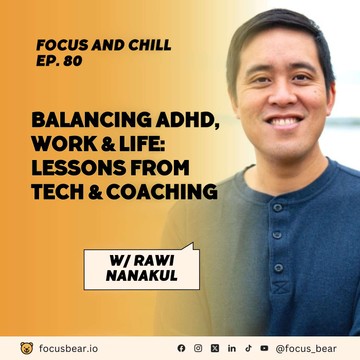
Feb 17, 2025 • 43min
Episode 80: Rawi Nanakul
Welcome to episode #80! We’re thrilled to be joined by Rawi Nanakul today.Rawi Nanakul is the founder of Tech Atypically, a newsletter and coaching service dedicated to helping neurodivergent professionals in the tech industry. With a background in ADHD research, product management, and kickboxing, Rawi’s career spans multiple industries, reflecting his deep curiosity and adaptability.Diagnosed with ADHD as an adult, Rawi has navigated the challenges of career shifts, emotional regulation, and balancing multiple roles. He now helps tech professionals thrive by integrating ADHD-friendly strategies into their work and personal lives.In this episode, we discuss ADHD in relationships, workplace challenges, emotional regulation, and how to build a sustainable career while embracing neurodivergence.Welcome to the show, Rawi!QuestionsJN: When did you first realize you were neurodivergent?Discovered ADHD during marriage therapy—therapist noticed common ADHD strugglesInitially skeptical due to his research background but sought an assessmentDiagnosis changed his perspective on past struggles and relationshipsJN: How did ADHD impact your personal relationships?Struggled with forgetfulness and follow-through, leading to resentment in his marriageBiggest improvement came from learning to communicate emotions and needsRecognized the fear of being vulnerable and how it affected relationshipsJN: How did ADHD affect your career path?Quit things when they got hard, leading to feelings of shameHad at least nine different careers, constantly shifting interestsRealized that his curiosity and adaptability were strengths, not failuresJN: How did you reframe your career journey?Identified his core values: curiosity and inclusionRecognized that each career move was intentional and aligned with his valuesShifted perspective from “falling behind” to “climbing multiple mountains”JN: What are the three career paths you're currently balancing?Tech Industry: Works as a project manager in a large fintech company, specializing in operationsADHD Coaching: Helps neurodivergent professionals succeed at work and in lifeWhiskey Business: Co-founder of Common Ritual, a whiskey company supporting underrepresented distilleriesJN: How do you manage emotional regulation in high-stakes work environments?Recognizes that emotional regulation is key to focus and decision-makingUses self-awareness to understand why he reacts a certain wayFinds that naming emotions helps create distance and reduce impulsive responsesJN: What productivity strategies work best for you?Breaks work into structured sprints with clear prioritiesUses coaching techniques to make difficult tasks emotionally "cheaper"Implements meeting strategies to avoid burnout (e.g., scheduling buffer time)JN: What does your morning routine look like?Reads first thing in the morning to avoid screen distractionsGoes for a run, using the time to process thoughts and plan the dayUses daily affirmations to set a positive mindsetJN: How do you wind down at night?Follows a sleep strategy: no caffeine (10 hrs before), no alcohol (3 hrs before), no screens (1 hr before)Uses medication and a CPAP machine to improve sleep qualityAims to minimize screen time but admits it’s a work in progressJN: Where can people connect with you?Coaching website: https://www.techatypically.com/LinkedIn: https://www.linkedin.com/in/rawi-nanakul/Instagram: https://www.instagram.com/tech.atypically/Newsletter: https://adhdpm.substack.com/JN: Final words for the audience?ADHD is both a gift and a disability—both realities should be acknowledgedAvoid the “superpower” narrative that dismisses those who struggle moreEmbrace your strengths, but don’t ignore the challenges neurodivergence bringsMore from Focus Bear:Website: https://focusbear.ioLinkedIn: https://www.linkedin.com/company/focus-bear/Youtube: https://www.youtube.com/@focusbearappTwitter: https://twitter.com/focusbear1Instagram: https://www.instagram.com/focus_bear/Facebook: https://www.facebook.com/focusbearapp/Podcast: https://podcast.focusbear.ioTiktok: https://www.tiktok.com/@focusbearConnect with Jeremy:LinkedIn: https://linkedin.com/in/nageljeremyEmail: jeremy@focusbear.ioConnect with Joey:LinkedIn: https://www.linkedin.com/in/joeycorea/Newsletter: https://thepluckyjester.com/newsletter/
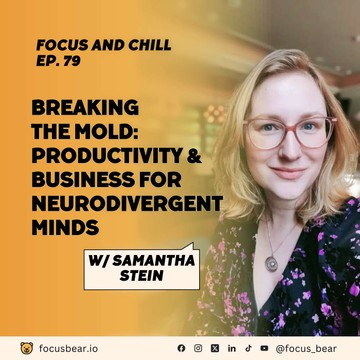
Feb 17, 2025 • 43min
Episode 79: Samantha Stein
Welcome to episode #79! We’re thrilled to be joined by Samantha Stein today.Samantha Stein, known online as YoSandySam, is a YouTube creator, author, and business strategist for neurodivergent entrepreneurs. Diagnosed with autism at 33 and ADHD shortly after, she began making YouTube videos to process her diagnosis and educate neurotypicals about what autism really looks like. Her content resonated widely, amassing over 14 million views.In addition to YouTube, Samantha is the author of So You Think You’re Autistic, a workbook that helps newly diagnosed individuals navigate their neurodivergence. She’s currently working on a new book about neurodivergence and trauma, set to release in 2026. She also works with neurodivergent business owners, helping them build sustainable strategies for success, and recently hosted the first-ever Wild Brains Retreat in the Netherlands.Today, she joins us to discuss her journey, content creation, business coaching, and productivity strategies for neurodivergent minds.Welcome to the show, Samantha!QuestionsJN: When did you first suspect you were neurodivergent?Always felt different but internalized it as a personal flawPsychology degree exposed her to outdated autism theories (e.g., “extreme male brain”), which didn’t fit her experienceStruggled with mental health throughout her 20s (depression, anxiety) but never linked it to autismPostpartum period triggered a breakdown in masking, making her realize something deeper was going onJN: What was your diagnosis process like?Struggled with imposter syndrome, worried she was “too good at masking” to be diagnosedWent to her assessment with a seven-page Google Doc listing symptomsDiagnostician confirmed autism easily, but the diagnosis felt anticlimactic—left wondering, “Now what?”JN: How did receiving an official diagnosis change things for you?Initially overwhelming, but led to self-acceptance over timeInspired her to start making YouTube videos as a way to process and educate othersHelped her understand her past struggles and navigate life more effectivelyJN: What are some of the biggest myths about autism that you address in your content?Stereotypes (e.g., only young boys like trains)Misconception that autism only presents in certain waysThe need for diverse representation in autism content, including cultural and racial perspectivesJN: What has been the impact of your YouTube channel?Over 14 million views and a growing neurodivergent communityLed to opportunities like publishing books and working with neurodivergent business ownersHelped push for more diverse and accurate representation of autism onlineJN: Can you tell us about your work with neurodivergent business owners?Helps them create sustainable business strategies that align with their neurodivergent strengthsFocuses on accountability, structure, and breaking tasks into manageable stepsAdvocates for working smarter, not harder—rejecting hustle culture in favor of efficiencyJN: What’s your approach to productivity as a neurodivergent person?Rejects the idea of “doing a little bit every day” in favor of deep work and hyperfocus sprintsUses external accountability and structured planning to stay on trackCreates work schedules that prevent burnout rather than chasing traditional productivity modelsJN: What does your morning routine look like?Survival mode—starts the day managing kids’ needsTries to fit in a workout or walk if possibleTidies up the house and prepares for the day aheadNo elaborate self-care rituals—just getting through the morning efficientlyJN: How do you wind down at night?Watches TV while using a second screen (phone)Occasionally plays piano with headphones as a calming activityPrioritizes sleep and avoids working in the evenings to maintain boundariesJN: Where can people connect with you?YouTube: YoSamdySamWebsite: yosamdysam.comPodcast: Awkward ConversationsInstagram: @YoSandySam Book: So You Think You’re Autistic (Available on Amazon)JN: Final words for the audience?Self-understanding and acceptance are the keys to sustainable successBe mindful of burnout and create work habits that actually fit your brainIt’s okay to need support—humans are meant to work together, not struggle aloneMore from Focus Bear:Website: https://focusbear.ioLinkedIn: https://www.linkedin.com/company/focus-bear/Youtube: https://www.youtube.com/@focusbearappTwitter: https://twitter.com/focusbear1Instagram: https://www.instagram.com/focus_bear/Facebook: https://www.facebook.com/focusbearapp/Podcast: https://podcast.focusbear.ioTiktok: https://www.tiktok.com/@focusbearConnect with Jeremy:LinkedIn: https://linkedin.com/in/nageljeremyEmail: jeremy@focusbear.ioConnect with Joey:LinkedIn: https://www.linkedin.com/in/joeycorea/Newsletter: https://thepluckyjester.com/newsletter/
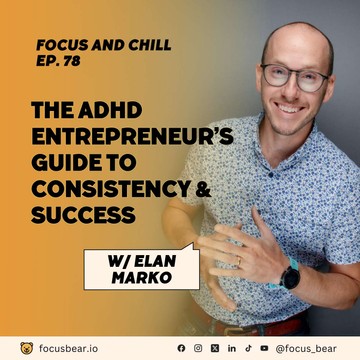
Feb 16, 2025 • 39min
Episode 78: Elan Marko
Welcome to episode #78! We’re thrilled to be joined by Elan Marko today.Elan Marko is the founder of Deep Work Sprints, a coaching company dedicated to helping ADHD entrepreneurs accomplish their goals faster. His work focuses on overcoming procrastination, perfectionism, and stress by harnessing ADHD strengths to create more fun, flow, and financial success.After being diagnosed with ADHD during the pandemic, Elan dove deep into research and conducted studies on ADHD entrepreneurs to uncover what truly drives success. Now, he helps entrepreneurs stay consistent, remove distractions, and build the right environment to thrive.Welcome to the show, Elan!QuestionsJN: What was your journey to discovering your ADHD?Always suspected ADHD but never pursued a diagnosisDuring COVID, a business coach suggested getting testedRead an ADHD story online and immediately related to itDiagnosis explained past struggles but came with little guidanceJN: How did ADHD impact your education and early career?Struggled to focus on studying in university, couldn’t sit stillTried to get diagnosed in college but was discouraged by high costs and lack of treatment optionsRealized he needed structure and external accountability to thriveJN: How did your diagnosis change your approach to work?Went into hyperfocus mode, researching everything about ADHDNoticed that many of his coaching clients also had ADHDShifted his business to focus entirely on ADHD entrepreneursJN: Can you tell us about your ADHD entrepreneur studies?Interviewed 35 ADHD entrepreneurs, later expanded to multimillionaire ADHD entrepreneursFound that consistency—not talent—was the biggest predictor of successSuccessful entrepreneurs set up "bumper rails" to avoid distractions and failureMost entrepreneurs knew what they needed to do but struggled to follow throughJN: What were the biggest struggles ADHD entrepreneurs faced?Feeling like they weren’t meeting their full potentialLost revenue and opportunities due to unfinished projectsDifficulty maintaining business and personal relationshipsJN: What does Deep Work Sprints focus on?Helps ADHD entrepreneurs achieve their goals by creating structured, focused work sessionsUses body doubling and accountability to keep clients on trackFocuses on consistency and creating the right work environmentJN: What are some key productivity strategies that work for ADHD?Weekly "sprint" planning: setting three critical tasks each weekBreaking down tasks into ultra-clear stepsFinding unique ways to optimize performance (e.g., sales road trips)Creating the right environment by eliminating distractionsJN: Is consistency possible for ADHD brains?Daily consistency is difficult, but weekly consistency is achievableBuilding the right systems allows for sustainable performanceExercise, structured work environments, and clear goals make a big differenceJN: What does your morning routine look like?Starts the day with meditation using a visual timerRuns Deep Work Sprints with entrepreneurs in coworking sessionsBikes his daughter to school as part of his daily exerciseUses cold exposure (cold showers) to build resilienceJN: How do you wind down at night?Creates a plan for the next day before bedAvoids Netflix and social media to improve sleepListens to audiobooks at a slower speed to relax before sleepingJN: Where can people connect with you?Website: Deep Work SprintsInstagram: @adhdcoachelanJN: Final words for the audience?"Your neurodivergence is your superpower. Learn your strengths, minimize your weaknesses, and create an environment where you can thrive."More from Focus Bear:Website: https://focusbear.ioLinkedIn: https://www.linkedin.com/company/focus-bear/Youtube: https://www.youtube.com/@focusbearappTwitter: https://twitter.com/focusbear1Instagram: https://www.instagram.com/focus_bear/Facebook: https://www.facebook.com/focusbearapp/Podcast: https://podcast.focusbear.ioTiktok: https://www.tiktok.com/@focusbearConnect with Jeremy:LinkedIn: https://linkedin.com/in/nageljeremyEmail: jeremy@focusbear.ioConnect with Joey:LinkedIn: https://www.linkedin.com/in/joeycorea/Newsletter: https://thepluckyjester.com/newsletter/
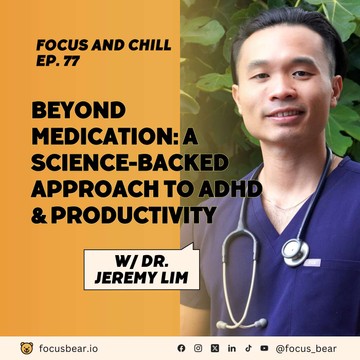
Feb 16, 2025 • 41min
Episode 77: Dr. Jeremy Lim
Welcome to episode #77! We’re thrilled to be joined by Dr. Jeremy Lim today.Dr. Jeremy Lim is a board-certified lifestyle medicine physician and experienced medical doctor. He runs Whole Being Medical, an online practice that takes a multifaceted approach to treating chronic pain and neurodivergence. With a deep understanding of ADHD, he is dedicated to harm reduction and empowering his patients with holistic strategies for well-being.In this episode, Dr. Lim shares his personal ADHD journey, insights into lifestyle medicine, and practical strategies for optimizing productivity, sleep, and mental health.Welcome to the show, Dr. Lim!QuestionsJN: When did you first realize you weren’t neurotypical?Labeled as disruptive from a young age in schoolParents didn’t have knowledge of ADHD, but father helped with learningDiagnosed with ADHD at 19 during university strugglesJN: How did your diagnosis impact your perspective?Provided clarity and understanding of personal strugglesTrialed stimulant medication for six months, had mixed experiencesInspired him to become a doctor to help others with ADHDJN: What was your experience with social interactions growing up?Faced social exclusion due to ADHD traits and rejection sensitivityNeurodivergence made relationship-building more difficultWants to help others feel seen and understoodJN: What strengths have you discovered through ADHD?ADHD traits, like thinking outside the box, can be strengths in the right environmentCompares ADHD to a sports car—powerful, but needs the right tools to function wellBelieves neurodivergence has contributed to human evolution and innovationJN: Can you tell us about your medical practice and approach?Runs Whole Being Medical, an online lifestyle medicine practiceUses a six-pillar approach: nutrition, sleep, exercise, relationships, stress management, and mindsetFocuses on holistic well-being rather than just medicationJN: How do you optimize productivity as someone with ADHD?Uses the "Eat That Frog" method—tackles the hardest task firstCreates a detailed outline of tasks to break down big projectsPrioritizes movement, hydration, and preparation in the morningJN: What productivity advice doesn’t work for you?Rejects hustle culture and constant comparison on social mediaBelieves in consistency over chasing hyperfocus highsEncourages realistic expectations and self-compassionJN: What does your morning routine look like?Keeps it simple to avoid resistanceFour key elements: hygiene, hydration, movement, and proteinPrepares warm clothes the night before to make waking up easierJN: How do you wind down at night and improve sleep?Follows the 3-2-1 rule: no big meals three hours before bed, no fluids two hours before bed, no screens one hour beforeAvoids caffeine, alcohol, and cannabis close to bedtimeUses magnesium supplements and mindfulness to aid relaxationJN: Where can people connect with you?Website: https://www.wholebeingmedical.com.au/JN: Final words for the audience?“Don’t get lost in the sauce. Just do the next right thing.”Focus on small, meaningful steps rather than feeling overwhelmedMore from Focus Bear:Website: https://focusbear.ioLinkedIn: https://www.linkedin.com/company/focus-bear/Youtube: https://www.youtube.com/@focusbearappTwitter: https://twitter.com/focusbear1Instagram: https://www.instagram.com/focus_bear/Facebook: https://www.facebook.com/focusbearapp/Podcast: https://podcast.focusbear.ioTiktok: https://www.tiktok.com/@focusbearConnect with Jeremy:LinkedIn: https://linkedin.com/in/nageljeremyEmail: jeremy@focusbear.ioConnect with Joey:LinkedIn: https://www.linkedin.com/in/joeycorea/Newsletter: https://thepluckyjester.com/newsletter/
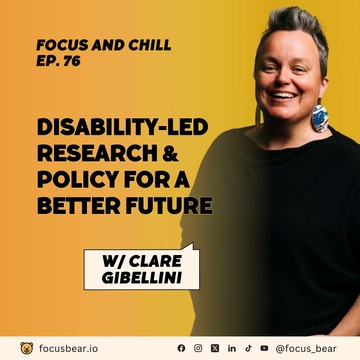
Feb 15, 2025 • 40min
Episode 76: Clare Gibellini
Welcome to episode #76! We’re thrilled to be joined by Clare Gibellini today.Clare Gibellini is a passionate advocate for disability inclusion in Australia and internationally. She is the co-chair of the Oversight Council for the First National Autism Strategy and the deputy chair of WA’s Ministerial Advisory Council on Disability. Clare also works as a policy officer for Women with Disabilities Australia and has been newly appointed as the chair for the National Disability Research Partnership.With a background in advocacy, research, and policy reform, Clare is committed to creating a more inclusive world. In this episode, she shares her journey of discovering her neurodivergence, the challenges of navigating multiple roles, and her strategies for balancing advocacy, productivity, and self-care.Welcome to the show, Clare!QuestionsJN: What was your journey to discovering your neurodivergence?Grew up as a military kid, constantly moving, which made it difficult to understand differencesRealized similarities with her son after his autism diagnosisReceived her own autism diagnosis from the same clinician who diagnosed her sonDiagnosis helped her understand herself, parent differently, and practice self-compassionJN: How did the diagnosis change your self-perception?Stopped internalizing negative self-talkDeveloped strategies to manage social situations and advocate for herselfShifted perspective from “something’s wrong with me” to “society isn’t built inclusively”JN: What are your current work roles?Policy officer at Women with Disabilities AustraliaCo-chair of the National Autism StrategyChair of the National Disability Research Partnership (NDRP)Advocates for more disability-led research and inclusive policy developmentJC: How do you manage multiple high-responsibility roles?ADHD helps her balance tasks by switching between projectsStrong support network keeps her accountable and reminds her to take breaksFinds fulfillment in advocacy work, which fuels her motivationJC: How do you prevent burnout in advocacy and policy work?Limits social media engagement to avoid negativity and toxicityHas hobbies unrelated to disability work, including volunteering for emergency servicesEngages in creative activities like crocheting, gardening, and bakingWorks out regularly to manage chronic pain and mental well-beingJN: What does your work in disability research aim to achieve?Advocates for disability-led, purpose-driven research to inform better policiesAims to include lived experience in research rather than extractive studiesPushes for research that improves real-life outcomes rather than abstract academiaJC: How do you optimize productivity during the day?Works from home to manage sensory needsUses a yoga ball chair for movement while workingSchedules movement breaks and weight training to stay regulatedUses live transcription instead of note-taking to stay fully engaged in meetingsJC: What productivity advice doesn’t work for you?Finds back-to-back meetings overwhelming and non-productiveRejects corporate jargon and vague email requests—prefers direct communicationPushes back against the expectation to have cameras on in every virtual meetingJN: What does your morning routine look like?Not a morning person, keeps routine simplePrepares everything the night before to reduce stressGets her son ready for school, grabs coffee, and starts work with a structured planRelies on checklists and habit-tracking apps to stay organizedJN: How do you manage sleep with ADHD and frequent travel?Struggles with sleep due to travel, ADHD, and hormonal cyclesCreates a familiar sleep environment by mimicking hotel room settings at homeUses earplugs and occasional sleep medication when necessaryJN: Where can people connect with you?LinkedIn: linkedin.com/in/clare-gibellini-653b98142JC: Final words for the audience?The disability advocacy space is tough right now, but don’t give upSurround yourself with good people and protect your energyKeep pushing for change—we will get thereMore from Focus Bear:Website: https://focusbear.ioLinkedIn: https://www.linkedin.com/company/focus-bear/Youtube: https://www.youtube.com/@focusbearappTwitter: https://twitter.com/focusbear1Instagram: https://www.instagram.com/focus_bear/Facebook: https://www.facebook.com/focusbearapp/Podcast: https://podcast.focusbear.ioTiktok: https://www.tiktok.com/@focusbearConnect with Jeremy:LinkedIn: https://linkedin.com/in/nageljeremyEmail: jeremy@focusbear.ioConnect with Joey:LinkedIn: https://www.linkedin.com/in/joeycorea/Newsletter: https://thepluckyjester.com/newsletter/
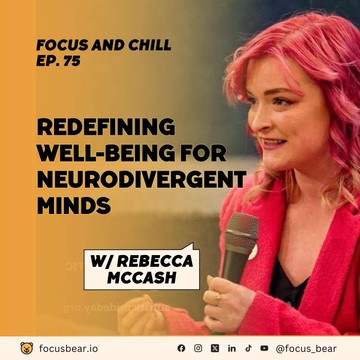
Feb 15, 2025 • 34min
Episode 75: Rebecca McCash
Welcome to episode #75! We’re thrilled to be joined by Rebecca McCash today.Rebecca McCash is the founder and CEO of FutureTech Australia, a neurodivergent-led social enterprise focused on inspiring the next generation of neurodivergent minds. FutureTech provides STEAM-based (Science, Technology, Engineering, Arts, and Math) social and learning opportunities designed and delivered by neurodivergent individuals.Rebecca is also an inclusion consultant for ASPEC’s Autism Friendly team, a member of Catalyst 2030, CECNA, and the Australian National Autism Strategy Economic Inclusion Working Group. With nearly a decade of experience in the disability sector, Rebecca is passionate about genuine co-design, neurodivergent well-being, and creating inclusive learning environments.Welcome to the show, Rebecca!QuestionsJN: When did you realize you weren’t neurotypical?Early exposure to neurodiversity through her younger brother’s autism and ADHD diagnosisStruggled with chronic depression, anxiety, and eating disorders before being diagnosed at 26Diagnosis provided a framework for understanding and supporting herselfJN: How has your diagnosis changed your life?Allowed for self-advocacy and better life choicesStopped forcing socialization and instead focused on deeper, meaningful relationshipsEmbraced special interests, especially learning and neurodivergence researchJN: What are your thoughts on the term "special interests"?Doesn’t mind it but acknowledges some prefer "obsessions" or "passions"Finds joy in deep-diving into interests like penguins, research, and STEAM topicsJN: How does your work align with your passions?FutureTech focuses on neurodivergent-led STEAM education and community capacity buildingAdvocates for shifting the focus from making autistic people fit into neurotypical expectations to celebrating neurodivergent strengthsJN: What is the neurodivergent well-being framework you’re working on?Traditional well-being metrics (e.g., academic achievement) don’t fully apply to neurodivergent peopleDeveloped an alternative model emphasizing curiosity, self-advocacy, and interest-driven learningAims to help educators, parents, and workplaces better support neurodivergent individualsJN: What productivity strategies work for you?Uses extensive safety nets like calendar blocking, structured environments, and automation tools (e.g., Calendly)Finds body doubling unhelpful but thrives with task chunking and completing work in one sittingOffloads cognitive tasks to external systems to avoid overwhelmJN: What does your morning routine look like?Wakes up early and starts the day with herbal tea, tidying up, and checking emailsUses structured routines to maximize productivity and mental clarityFinds early mornings the best time for deep workJN: How does narcolepsy impact your sleep, and what helps?Struggles with disrupted sleep cycles due to constantly shifting between sleep stagesUses sleep music, hypnosis tracks, and a weighted blanket for better restTakes a mid-day nap to compensate for limited nighttime sleepJN: What do you enjoy doing outside of work?Loves learning, reading, and researching a variety of topics, from neuroscience to economicsEnjoys dancing, especially pole dancing, as a way to stay active and express herselfJN: Where can people connect with you?LinkedIn: linkedin.com/in/rebecca-mccash-589b43195FutureTech Website: https://www.futuretechaustralia.org/Facebook: https://www.facebook.com/futuretechaustraliaInstagram: https://www.instagram.com/futuretechaustralia/JN: Final words for the audience?Find what works for you instead of forcing conventional productivity and relaxation methodsAdvocate for neurodivergent-friendly well-being frameworksLean into your strengths and embrace what makes you uniqueMore from Focus Bear:Website: https://focusbear.ioLinkedIn: https://www.linkedin.com/company/focus-bear/Youtube: https://www.youtube.com/@focusbearappTwitter: https://twitter.com/focusbear1Instagram: https://www.instagram.com/focus_bear/Facebook: https://www.facebook.com/focusbearapp/Podcast: https://podcast.focusbear.ioTiktok: https://www.tiktok.com/@focusbearConnect with Jeremy:LinkedIn: https://linkedin.com/in/nageljeremyEmail: jeremy@focusbear.ioConnect with Joey:LinkedIn: https://www.linkedin.com/in/joeycorea/Newsletter: https://thepluckyjester.com/newsletter/
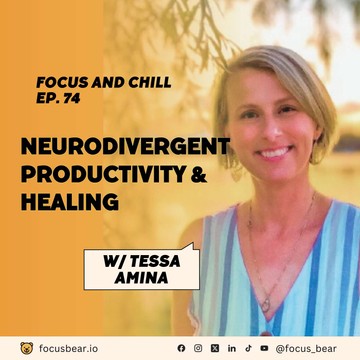
Feb 15, 2025 • 37min
Episode 74: Tessa Amina
Welcome to episode #74! We’re thrilled to be joined by Tessa Amina today.Tessa Amina is the founder of Intuitive Expression and is a neurodivergent therapist, coach, and Reiki practitioner. They offer international coaching for professionals, drawing on lived experience with depression, anxiety, PTSD, religious trauma, grief, neurodiversity, and addiction.Tessa provides compassionate support for mental health challenges, spiritual growth, and creative blocks. They’re here today to share insights on living as a neurodivergent person and offer productivity tips.Welcome to the show, Tessa!QuestionsJN: When did you realize you weren’t neurotypical?Diagnosed with ADHD at 31 while working in an acute care psychiatric hospitalStruggled with details and a fast-paced environment, leading to diagnosisLooking back, childhood and school difficulties made sense after diagnosisJN: How did that realization impact your self-perception?Brought self-compassion and understanding of past strugglesLong-standing difficulties with organization, testing, and classroom behaviorJN: What strategies have helped you manage ADHD post-diagnosis?Shifted to a less intense work environment and started a private practiceSupplements (influenced by Dr. Daniel Amen) instead of stimulantsUses isochronic tones and sound therapy for focusJN: Can you explain isochronic tones?Similar to binaural beats but don’t require earbudsUsed in a cubicle setting to help maintain focusJN: How did changing your work environment help you lean into your strengths?Focuses on therapy, coaching, and Reiki—things they naturally excel atUses mornings for administrative tasks when their brain is freshestJN: What role does Mind-Body Bridging play in your daily routine?Foundation of their work, helping with self-awareness and emotional regulationUses mapping techniques for processing thoughts before big conversationsJN: Do you prefer working with individuals or groups?Currently works one-on-one but is considering starting group workshopsJN: What are your hobbies outside of work?Loves movies, especially Pixar, cerebral films, and documentariesPassion for poetry, nature, and trying diverse cuisinesRecently traveled to France and enjoyed exploring food cultureJN: How do you optimize productivity during the day?Uses whiteboards and physical lists instead of apps for task managementKeeps workspaces clear and uses music to stay in the zoneJN: What productivity advice doesn’t work for you?The concept of “grit” isn’t helpful—forcing tasks through pressure backfiresInstead, they set false deadlines to create urgency without anxietyJN: What does your morning routine look like?Coffee, reading, meditation, and Mind-Body Bridging before workUses mapping to prepare for big meetings or conversationsJN: How do you wind down at night?Uses silence, meditation, and supplements like lemon balm, CBD, and magnesiumEngages in Mind-Body Bridging and sensory grounding to relax before sleepJN: Where can people connect with you?Email: tessarosemagic@gmail.comNeurodiversity NetworkJN: Final words for the audience?Don’t be afraid to ask for helpHonor your body—it will guide you if you listenLean into your strengths and celebrate themConnect with Tessa:LinkedIn: linkedin.com/in/tessa-amina-thulien-ma-lpc-a22aaa10Email: tessarosemagic@gmail.comWebsite: psychologytoday.com/us/therapists/intuitive-expression-westminster-co/1309665 Instagram: https://www.instagram.com/intuitiveexpressionllc/Connect with Jeremy:LinkedIn: https://linkedin.com/in/nageljeremyEmail: jeremy@focusbear.ioConnect with Joey:LinkedIn: https://www.linkedin.com/in/joeycorea/Newsletter: https://thepluckyjester.com/newsletter/More from Focus Bear:Website: https://focusbear.ioLinkedIn: https://www.linkedin.com/company/focus-bear/Youtube: https://www.youtube.com/@focusbearappTwitter: https://twitter.com/focusbear1Instagram: https://www.instagram.com/focus_bear/Facebook: https://www.facebook.com/focusbearapp/Podcast: https://podcast.focusbear.ioTiktok: https://www.tiktok.com/@focusbear
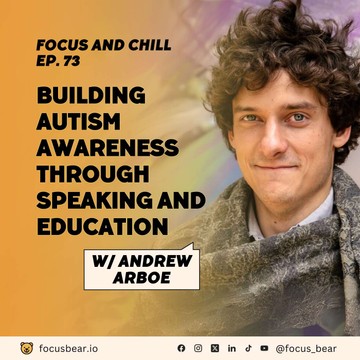
Jan 2, 2025 • 39min
Episode 73: Andrew Arboe
Welcome to episode #73 We’re thrilled to be joined by Andrew Arboe today. Andrew Arboe is a self-advocate with a professional work background consisting of public school, private school, nonprofits, and online programs. Andrew is also a public speaker known for talking throughout New England about autism and his personal experiences.Welcome to the show Andrew!QuestionsJN: Can you tell us about your experience with neurodiversity? When did you realise that you weren’t neurotypical? 5-6 y.o.Temple Grandin on the sceneInto video games/pokemonUpper elementary school started getting challengingWhat challenges did you face? Processing emotions when the environment is chaotic (raised voices)Unsure what to do after school - didn’t want to do tech/ITWhat strengths are you leaning into now?Explorer personality - play archetypeJC: What "work" projects are you concentrating on? 1 to 1 work in special education:Public schoolPrivate schoolHelping with social skillsE.g. helping with cooking - organising recipes etc.Letting go of expectations about NT work/driving abilitiesWriting/Public speaking/advocacy in different states - personal experience“Red mage”Studying psychologyJN: How about the rest of the time? What do you enjoy doing in your off time? Niche games Exploring different cities/coffee shopsClassic movies: The Red Shoes, It happened one nightAnime movies on big screenPuppy (9 month old German shepherd)JC: Productivity tips What do you do to optimise productivity during your working hours? CoffeeBreaksMeditation app - breaksDrivingGet ahead of work (e.g. reading history of psychology)Study music - anime movie music (peak fire)What is some unhelpful productivity advice that doesn’t work for you?Be careful about substance usage (even caffeine)Policing people about incorrect language usageBREAK JC: What does your morning routine look like and how has it evolved over time? Get up at 6 - take dog outEat bagelHave coffee at workJC: How is your sleep? How do you switch off at night? Video games to wind downRead book (Stuart Brown - Play book)Midnight sleepJN: Where can people connect with you or find your work? LinkedIn: https://www.linkedin.com/in/andrew-arboe/Website: https://andrewarboe.weebly.com/Instagram: https://www.instagram.com/andrewarboespeaker5/JC: Do you have any final words or asks for our audience? Don’t police people unnecessarily - be kindStart with small stepsThink of like leveling up like GokuDon’t give upMore from Focus Bear:Website: https://focusbear.ioLinkedIn: https://www.linkedin.com/company/focus-bear/Youtube: https://www.youtube.com/@focusbearappTwitter: https://twitter.com/focusbear1Instagram: https://www.instagram.com/focus_bear/Facebook: https://www.facebook.com/focusbearapp/Podcast: https://podcast.focusbear.ioTiktok: https://www.tiktok.com/@focusbearConnect with Jeremy:LinkedIn: https://linkedin.com/in/nageljeremyEmail: jeremy@focusbear.ioConnect with Joey:LinkedIn: https://www.linkedin.com/in/joeycorea/Newsletter: https://thepluckyjester.com/newsletter/
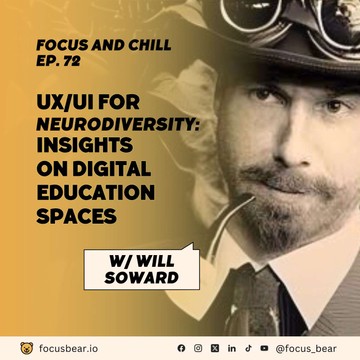
Dec 27, 2024 • 45min
Episode 72: Will Soward
Welcome to episode #72 We’re thrilled to be joined by Will Soward today. Will works creatively in a diverse field of digital media. He's invested in making online education more accessible for neurodiverse learners and the Web a better place to learn. Will talks about UX and accessible UI design with communities in the design and education space. He has 7 years as a UX designer under his belt, 12 years as an adult educator, and 20 years designing and coding front-end. Will is currently the Lead UX/LX Designer for Tait Communications in Aotearoa, New Zealand.Welcome to the show Will!QuestionsJN: Can you tell us about your experience with neurodiversity? When did you realise that you weren’t neurotypical? Dyslexia 11ADHD adultWhat challenges did you face? Masking - asking questionsAcademic - Rote learningSit still and listenSpeakingWhat changes have come post diagnosis?Context: why does it matter?More acceptance - stoicism - out of my controlEnvironmental changes - clutter, to do listsWhat challenges do you still face now?Rabbitholes during meetingInterruptingsolutionisingWhat neuroexceptional strengths are you leaning into now?Jump ahead to solve problems quicklyCreativityHyperfocusJC: What "work" projects are you concentrating on? Tait - accessibility designOnline learning - development + designMake it better for ND adultsJN: How about the rest of the time? What do you enjoy doing in your off time? Renovating house (last 8 yrs)Martial arts - forced calm and focus - karate -> taekwando -> BJJ -> muay thaiJC: Productivity tips What do you do to optimise productivity during your working hours? Philosophy: stoicismBreathing: calmingFlywheel to build up motivationListsKey priorities for the weekReprioritiseAlarm 30 minutes before need to leaveWhat is some unhelpful productivity advice that doesn’t work for you?Eat that frogBREAK JC: What does your morning routine look like and how has it evolved over time?Reprioritise listJC: How is your sleep? How do you switch off at night? Finish in evening at 5pm to make space for relationship - shut laptopJN: Where can people connect with you or find your work?Linkedin: https://www.linkedin.com/in/willsoward/Website: https://willsoward.com/JC: Do you have any final words or asks for our audience? Learn more about neurodiversityMore from Focus Bear:Website: https://focusbear.ioLinkedIn: https://www.linkedin.com/company/focus-bear/Youtube: https://www.youtube.com/@focusbearappTwitter: https://twitter.com/focusbear1Instagram: https://www.instagram.com/focus_bear/Facebook: https://www.facebook.com/focusbearapp/Podcast: https://podcast.focusbear.ioTiktok: https://www.tiktok.com/@focusbearConnect with Jeremy:LinkedIn: https://linkedin.com/in/nageljeremyEmail: jeremy@focusbear.ioConnect with Joey:LinkedIn: https://www.linkedin.com/in/joeycorea/Newsletter: https://thepluckyjester.com/newsletter/


